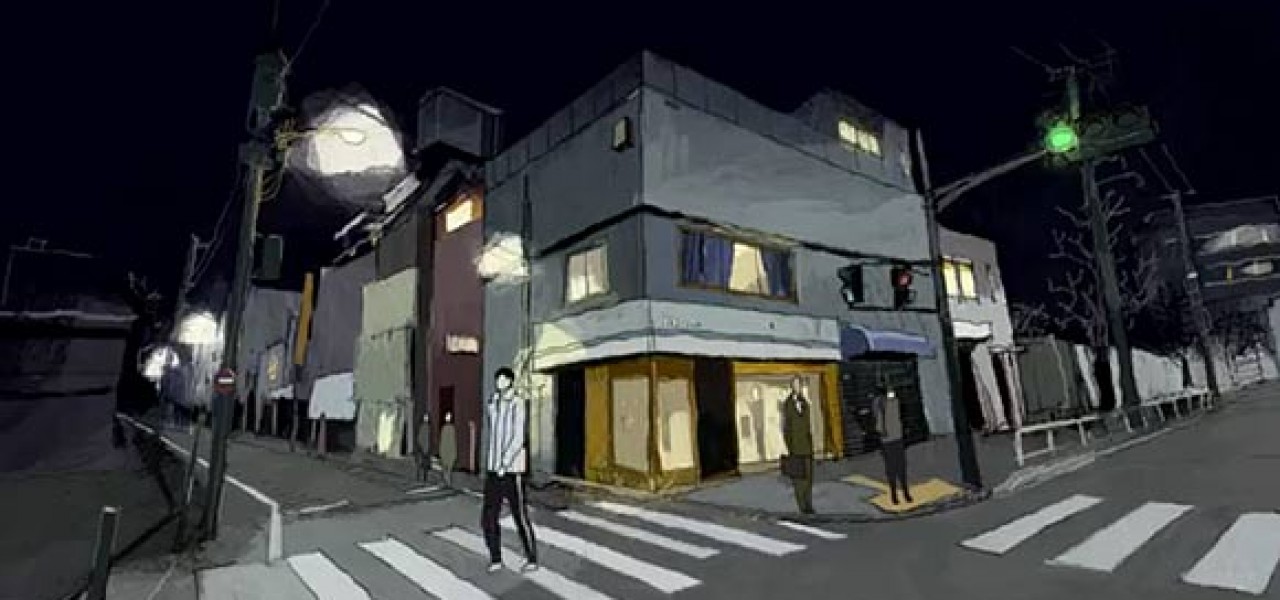
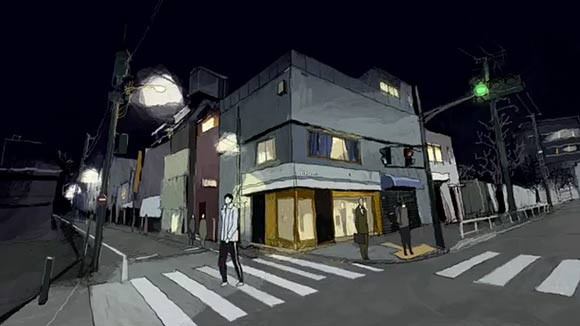
‘Ping Pong’ Recap: ‘Yes, My Coach’ (Ep. 7)
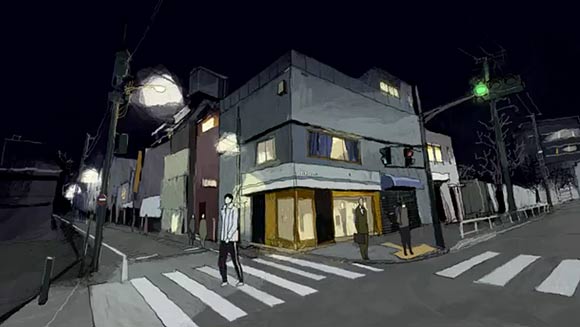
Kaio finally tries to poach Smile, Peco gets into the National Training Center with a little help from the old lady, and we learn about coach Koizumi’s storied past.
This episode was largely devoted to character development, and finally brought into focus just what a complicated web of character interrelations Yuasa has woven out of the original source material, much as he did in Mind Game. There was no single major driving plot element, but rather various themes and plotlines gradually converging. By this point it feels like what we are seeing is more Yuasa than Matsumoto.
So much occurs that it is somewhat overwhelming, if an impressive show. Sensory overload is the order of the day. It took a few viewings to piece together the relationships between the characters, and I still don’t think I have everything down.
After the doldrums of the previous episode, the characters are each in the ascendant again, pursuing the sport with renewed motivation borne of maturity. In the previous episode, Peco decided to get serious again. He now takes a first step towards this by moving from the old lady’s dojo to the National Training Center run by her son, where training is more structured. Smile meanwhile shows his maturity by ignoring his Coach’s recommendation and turning down Kaio’s offer to move there. No doubt the coach really did have his future in mind, but the coach should have known that such a phrase would only incite Smile to run the other way. I like Smile for being a dropout on the road of life who despite talent chooses not the elite academy of glory but the old coach of anonymous self-respect.
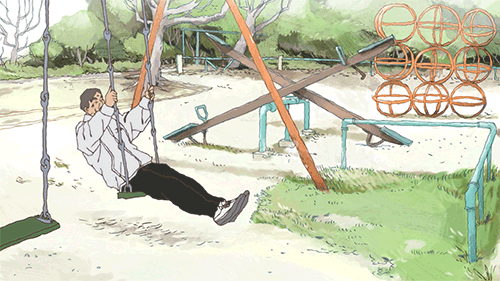
It seems coach Koizumi was himself once a rising ping pong star nicknamed Butterfly Joe due to the elegance of his movements. During one key match against a longtime friend, he refused to take advantage of his opponent’s injury. His career was ruined, but his friend’s career took off, and he became the president of Kaio: Ryu Kazama. The coach must have seen a little bit of himself in Smile when Smile refused to take down Kong earlier in the series. Ryuichi and Smile, then, inherit their respective mentors’ approaches to the sport: the one about winning, the one for the love of the sport.
Yurie begins to take on personality, punching the chocolate racket intended as a Valentine’s day gift to Ryuichi. A punch no doubt signifying frustration at her family’s control over Ryuichi, which she blames for his unresponsiveness. The final shot of Yurie returning to an empty home and glancing at the pot of Casablancas on the floor is quietly revealing of her conflicted heart.
Kong also still has some life in him. Languishing among ants, he takes to training on a robot arm that harbors the ghost of Ryuichi. I’m glad to see that his role in the story isn’t finished yet.
The meatiest part of the story, though, concerns the complicated family history of the Kazamas.
A brief flashback reveals much but passes so quickly and is so terse that critical information might be missed. If I understood correctly, Ryuichi’s mother married into the Kazamas, but when her husband died, it left her and her son in ill favor with her stepbrother Ryu Kazama’s side of the family. Ryuichi went on to become as ruthlessly competitive as his uncle Ryu, partly to erase the humiliation, but deep down perhaps he is just denying having the same nature as his father.
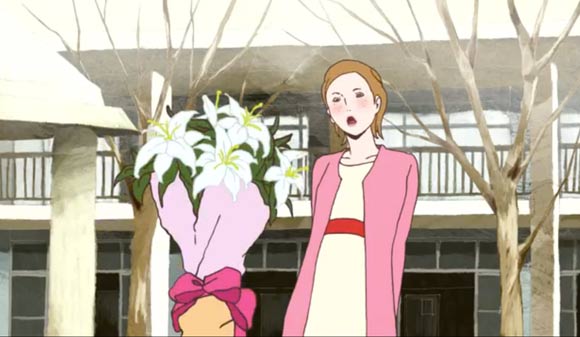
Flower symbolism continues to play a big part. The Casablanca lily specifically recurs several times, and seems to represent both Yurie as well as Ryuichi’s side of the family. When Ryuichi sees budding Casablancas after being asked by his coach whether he’s playing the kind of table tennis he truly believes in, it sets off a flashback in which the Casablanca adorns the funeral of his father, presumably a flower seller, where an angry in-law, presumably Ryu, berates the deceased in front of the mourning family. A rival appears and attempts to woo Yurie away from Ryuichi with a bouquet of Casablancas, obviously her favorite because of their association with Ryuichi.
We’re also finally privy to a blurb about Smile’s parents that is revealing of his character. His parents split and he lives with his mom, but he sees her only rarely because she’s working most of the time. Both he and Ryuichi are the product of a broken family. Peco, on the other hand, suffers the burden of an all-too-loving family, as evidenced by their show of support at the National Training Center.
Technically, the quality was spot-on without too much faltering. It seems as if the quality has gradually improved over the course of the show because they’ve had more time to work on the later episodes. Gainax regular Shoko Nishigaki was the lead animation director, and she no doubt helps to maintain the quality of the episode. Although known primarily for her work on Gainax shows, she has been involved in previous Yuasa productions and, unlike many Gainax animators, clearly has the versatility to adapt herself well to different kinds of material.
As is usual with this show, I didn’t recognize many names in the credits. Nothing stood out as particularly outstanding in terms of the animation. It’s not necessary to have an animation highlight in a different style, but I find an episode feels a little flat without one. Maybe the problem is I’ve gotten used to something that’s more the exception to the rule.
Ping Pong Episode 7: Yes, my coach
| Storyboard: Script: Series Structure: |
Masaaki Yuasa | |
| Episode Director: | Ryota Ito | |
| Chief Animation Director: | Nobutake Ito | |
| Animation Director: | Shoko Nishigaki | Kenji Shibata |
| Key Animation: | Hideyuki Sugiura | Hayao Enomoto |
| Hiromi Hata | Kyohei Sawada | |
| Yuki Nakano | Yuta Yokota | |
| Aiko Naikai | Yuichiro Omuro | |
| Tatsuhiko Komatsu | Takahito Sakazume | |
| Hiroshi Tanabe | Yukie Yamamoto | |
| Kozue Tanaami | Takeshi Iida | |
| Mirai Omuro | Mayu Saito | |
| Natsuko Shimizu | Takuya Saito | |
| Toshiro Fujii | Maiko Kobayashi | |
| Tetsuro Kaku | Shoko Nishigaki |

.png)